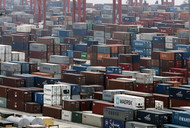LIVE LIKE YOU WERE DYING- GOODMORNING

by Steven Clark Goad
“You are a mist that appears for a little while and then vanishes” (James 4:14b).
“Man, whadya say when you get that kind of news? So I went sky divin’; I went Rocky Mountain climbin’; I went 2.7 seconds on a bull named Fu Man-chu.” So go the words of a popular country song.
Not that I would select those activities, mind you, if I’d just been told I was terminal (which I am), but there is something urgent about living when we’ve just been informed we haven’t much time left in this old world.
Terri Shaivo is gone. Karol Wojtyla (John Paul II) is gone. Oscar Osburn and Steve Ford and Aggie Bra-man and Bessie Beers and J. D. and Lester and Sibyl Leah and Emily are all on the other side now. And there is absolutely nothing we can do about it, except mourn perhaps, or rejoice. For, you see, church, we are all term-inal. Not one of us gets out of this alive. My step-mom Lucy was just given two weeks. Am I being unduly morbid? I think not. Realistic would be a better word.
Stay with me. Most of us have been urged to think of what we might do differently if we knew today was our last on planet earth. Granted, it’s a sobering thought. Bull-riding would not be at the top of my list, if only in deference to the blessed bull. Yet I do believe we might “talk a little sweeter” to those we know. Mom spent her last lucid days trying to share Jesus with as many as she could. What a neat example for a teenage son.
Hmmmm. If today were my last, would I do what I did yesterday? Would that much TV consume my time? Would the newspaper and Time and Newsweek and Read-er’s Digest redden my eyes? Would I mow the lawn one last time, wash the car, get my hair cut (chuckle), tell someone off, plan summer vacation, mop the floor, empty the trash, get set up for that giant yard sale? Or would I, just maybe, be more selective with my choices?
Oh, yes! I would definitely have a last supper with some of my dearest friends. I would be sure to remind them how much they mean to me and how I loved them so. I would speak to my sons and sister and dad and Jere and Carl and God. Yes! For sure!! I’d have a serious, focused, arduous talk with the “Holy Father.” I wonder why I didn’t do that yesterday. And instead of doing a crossword or reading the comics, I just might savor the Sermon on the Mount and Stephen’s bold farewell add-ress one more time.
Life is precious. Most of us cherish it-cling to it tenaciously. A few wish they had never been born. Life is a valuable gift from God. But it pales in comparison to salvation. “I came that you might have abundant life,” said the Master. Only in him can it possibly be lived abundantly. Yet life is temporary. Eternity is forever. So how shall the living secure their hearts? One day at a time. That’s how. One step at a time, dear Savior. I cannot take any more. Moment to moment. Thus, when you speak to another, do so kindly. When you are about to do something that belies your stewardship/discipleship, chose the higher road. Relish each day in the shadow of the cross. There may be no more tomorrows. So, “love a little deeper” as that smaltzy song says.
One more try. I suppose what I am struggling to say is, be sure to live like you were dying. Jesus did.
-Steven Clark Goad
CHINA UP TO DEM TRICKS
China Unexpectedly Reports Trade Surplus
By Bloomberg News – Apr 10, 2012 1:25 AM CT

China reported an unexpected trade surplus last month as import growth trailed forecasts, underscoring risks of a deeper slowdown in the world’s second- largest economy.
Inbound shipments rose 5.3 percent, the customs bureau said today, below the 9 percent median estimate in a Bloomberg News survey. Exports increased 8.9 percent from a year earlier, more than forecast, leaving a trade surplus of $5.35 billion, compared with a median projection for a $3.15 billion trade deficit.
Enlarge image
Containers are stacked at the Yangshan Deep Water Port in Shanghai. Photographer: Qilai Shen/Bloomberg
Play Video
April 10 (Bloomberg) — China reported an unexpected trade surplus last month as import growth trailed forecasts, underscoring risks of a deeper slowdown in the world’s second-largest economy. Inbound shipments increased 5.3 percent, the customs bureau said today, below the 9 percent median estimate in a Bloomberg News survey. Exports rose 8.9 percent from a year earlier, more than forecast, leaving a trade surplus of $5.35 billion, compared with a median projection for a $3.15 billion trade deficit. Margaret Conley reports from Shanghai on Bloomberg Television’s “First Look” with Caroline Hyde. (Source: Bloomberg)
Play Video
April 10 (Bloomberg) — Lu Ting, a Hong Kong-based economist with Bank of America Corp., talks about China’s economy and central bank monetary policy. Lu speaks with Rishaad Salamat on Bloomberg Television’s “On the Move Asia.” (Source: Bloomberg)
Play Video
April 10 (Bloomberg) — Andy Xie, former Morgan Stanley chief Asia-Pacific economist, talks about China’s trade surplus, economy and political risk. Xie speaks on Bloomberg Television’s “InBusiness With Margaret Brennan.” (Source: Bloomberg)
Asian stocks fell amid renewed concern about growth in China, fiscal woes in Europe and Federal Reserve Chairman Ben S. Bernanke’s comment that the U.S. economy was far from a full recovery. Premier Wen Jiabao may need to balance gains in external demand with a slowdown in domestic consumption in deciding whether to add monetary or fiscal stimulus.
“The sluggish import growth shows weakening domestic demand and investment growth while exports are stabilizing,” said Chang Jian, economist at Barclays Capital in Hong Kong who formerly worked for the World Bank. “Policy makers need to strike a delicate balance between preserving growth and containing inflation at this stage, yet they may tilt more toward sustaining growth in the second quarter.”
In Japan, the central bank refrained from expanding monetary easing to counter deflation, resisting pressure from lawmakers who five days ago rejected a nominee for the policy board. The Bank of Japan kept the key interest rate between zero and 0.1 percent and left its 30 trillion yen ($368 billion) asset-purchase fund and 35 trillion yen credit-lending program unchanged.
Stocks Fall
The MSCI Asia Pacific Index of stocks fell after the trade report, dropping 0.2 percent at 3:22 p.m. in Tokyo. China’s benchmark Shanghai Composite Index pared losses to trade 0.2 percent lower at 2:20 p.m. local time.
China Cosco Holdings Co. led declines for shipping companies, while Tianjin FAW Xiali Automobile Co. dropped the most in two weeks after sales slumped last month.
China reported a trade deficit of $31.5 billion in February, its first shortfall in a year and the biggest since at least 1989, as Europe’s debt crisis crimped exports and imports rebounded after a weeklong Chinese holiday.
The median forecast in a Bloomberg News survey of 29 economists was for a 7 percent gain in exports from a year earlier, after an 18.4 percent increase in February. Import growth, which compared with a 9 percent median estimate, slowed from 39.6 percent the previous month.
Iron, Steel Drop
The value of oil imports rose 26 percent in March from a year earlier to $20 billion, customs data show. Iron ore purchases fell 9.1 percent to $8.69 billion and steel product imports declined 20 percent to $1.68 billion. The value of goods imported for processing rose 2.6 percent to $33.8 billion.
“This should increase the chance of further loosening, as it reflects very weak import demand, thus weak domestic demand,” said Shen Jianguang, chief Greater China economist for Mizuho Securities Asia Ltd. in Hong Kong, who previously worked for the International Monetary Fund and European Central Bank.
Joy Yang, chief economist for Greater China at Mirae Asset Securities (HK) Ltd., said the trade surplus may delay any additional cut in the required reserves banks must hold. At the same time, a slump in imports and the domestic economy call for an interest-rate cut to support growth, a move that’s likely to happen around midyear as inflation drops, said Yang, who previously worked for the IMF.
Ensuring Growth
Speaking in southern China last week, Wen pledged to take measures including export tax rebates to ensure “steady growth” in trade this year and aid exporters hit by rising costs and weak demand, state media reported.
At the same time, the government is taking measures to stimulate imports and reduce the trade surplus that amounted to $155 billion last year. The State Council announced on March 30 cuts in import duties on some commodities and daily necessities.
China is countering a slowdown in exports to Europe by boosting sales to emerging markets. Carmakers including Geely Automobile Holdings Ltd. and Chery Automobile Co. will probably boost overseas shipments by about 50 percent this year, according to a February forecast from the China Chamber of Commerce for the Import & Export of Machinery & Electronic Products.
In Japan, the central bank may be preserving its ammunition for later in the month. Companies from Morgan Stanley to Mizuho Securities are predicting an expansion of easing at the BOJ meeting on April 27, when the price outlook is expected to show a gap between the 1 percent inflation target and actual price growth.
Australia Construction
Among other reports, a gauge of Australia’s construction industry held near a four-month low in March as housing and apartment building slumped, reflecting the highest benchmark interest rates among major developed nations.
Malaysian exports climbed 14.5 percent in February from a year earlier, the fastest pace in four months, while industrial production growth accelerated to a 20-month high of 7.5 percent, exceeding analyst forecasts.
In Europe, Germany said exports unexpectedly increased for a second month in February as the trade surplus widened to 14.7 billion euros ($19.3 billion). Finland, the Netherlands, France and Sweden are among European nations scheduled to release industrial production figures today.
The yuan had its first quarterly decline since December 2009 in the first three months of 2012, sliding 0.06 percent to close at 6.2980 per dollar March 30 in Shanghai, according to the China Foreign Exchange Trade System.
Inflation rose a more-than-forecast 3.6 percent in March as gains in food prices quickened, the statistics bureau reported yesterday.
China can pursue a “moderately loose” fiscal policy as growth slows yet can’t “substantially” ease monetary policy because of inflation, Tang Min from the Counsellors’ Office of the State Council said in today’s People’s Daily, the Communist Party’s mouthpiece.
–Zheng Lifei. With assistance from Ailing Tan in Singapore, Sunil Jagtiani in New Delhi and Nerys Avery and Li Yanping in Beijing. Editors: Scott Lanman, Brendan Murray
To contact Bloomberg News staff for this story: Zheng Lifei in Beijing at [email protected]
MY NEW FAVORITE ARTIST…!
FULL A TALENT… ![]()
****RULES**** 1. Debates and rebuttals are allowed but disrespectful curse-outs will prompt immediate BAN 2. Children are never to be discussed in a negative way 3. Personal information eg. workplace, status, home address are never to be posted in comments. 4. All are welcome but please exercise discretion when posting your comments , do not say anything about someone you wouldnt like to be said about you. 5. Do not deliberately LIE on someone here or send in any information based on your own personal vendetta. 6. If your picture was taken from a prio site eg. fimiyaad etc and posted on JMG, you cannot request its removal. 7. If you dont like this forum, please do not whine and wear us out, do yourself the favor of closing the screen- Thanks! . To send in a story send your email to :- [email protected]











Recent Comments